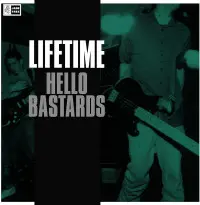Hello Bastards: twenty-three minutes of fast, driving, beautiful melodic hardcore. It was ahead of its time and still relevant today.
Jersey's Best Dancers may have been a better exemplification of Lifetime's groundbreaking and engaging sound—and may be a better album--, but Hello Bastards was where it all began. Yes, they released Background before Bastards, but that motherfucker is out of print, and no one really remembers that one anyway. Hello Bastards was the album that took Lifetime from the basements of Jersey to the ears of punk and hardcore fans everywhere. It was the first true bastard child of hardcore, punk, and emo.
The album kicked off in typical punk-hardcore fashion: a fast bassline and a quick drum fill into a breakneck hardcore introduction. It sounded like your standard punk-hardcore fare. Then, things got different. Katz began singing in a gritty, but melodic voice that sounded closer to Jawbreaker than hardcore. "Daneurysm" was a perfect example of a Lifetime song. It was fast and gritty, melodic and catchy, and over quickly. It was introspective and personal, too, something nearly unheard of in hardcore. The second track, "Rodeo Clown", upped the ante with a catchy, often-repeated lead guitar line and a lyrical focus on relationships. Following suit, the lyrics of "Anchor", "Bobby Truck Tricks", and "I Like You Ok" read more like teenage diary entries than hardcore songs. "I'm Not Calling You" felt like an extended hardcore breakdown in song form; it was brutally repetitive and poundingly emotional. The album was fairly consistent in its somewhat revolutionary format: nearly every song was a combination of fast, driving hardcore drums and bass, accompanied by melodic guitars and Katz's distinctive emotive vocals. It was the sort of album you threw on and sang along to, but before you knew it, the album was over.
The blend of emotional, melodic vocals with hardcore and punk wasn't as common then as it is now. For some, Ari Katz's vocal style and lyrics must've seemed shockingly out of place at the time. He wore his heart on his sleeve and approached subjects like awkward relationships and basement show culture with a shameless honesty. Punk and (especially) hardcore had always been the realm of sneering politics, cultural extremism and flippant cynicism. Emo was for the sensitive losers who were, well, too emotional. Katz and company found the in-between. The music could still be fast, gritty, and snotty, while the vocals could still have melody and the lyrics could have emotional poignancy.
Lifetime's influence would be seen in bands that continued to take from the melody and intricacy of emo, while still pulling with the fiery drive of punk and hardcore. Bands would take the Lifetime sound and push it in an even easier to digest and pop-fueled form. Taking Back Sunday, Brand New, Saves the Day and The Movielife would all draw from Lifetime to find themselves even more success and acclaim. Lifetime themselves would push their sound in this direction when they reformed in 2006 to release a self-titled album, one with an even more pop-punk oriented sound. Founding guitarist Dan Yemin would explore the Lifetime sound in other projects, pushing it to all extremes: Paint It Black pushed the dial towards hardcore, while Kid Dynamite was grittier standard melodic punk fare. But elements of all of this future work could be seen in Hello Bastards. Katz singing "I'm confused about everything" over high-speed drums was a call-to-arms for emotional hardcore punks everywhere. Lifetime showed them that hardcore and punk music could get emotional. Brutal music could be beautiful, too.
